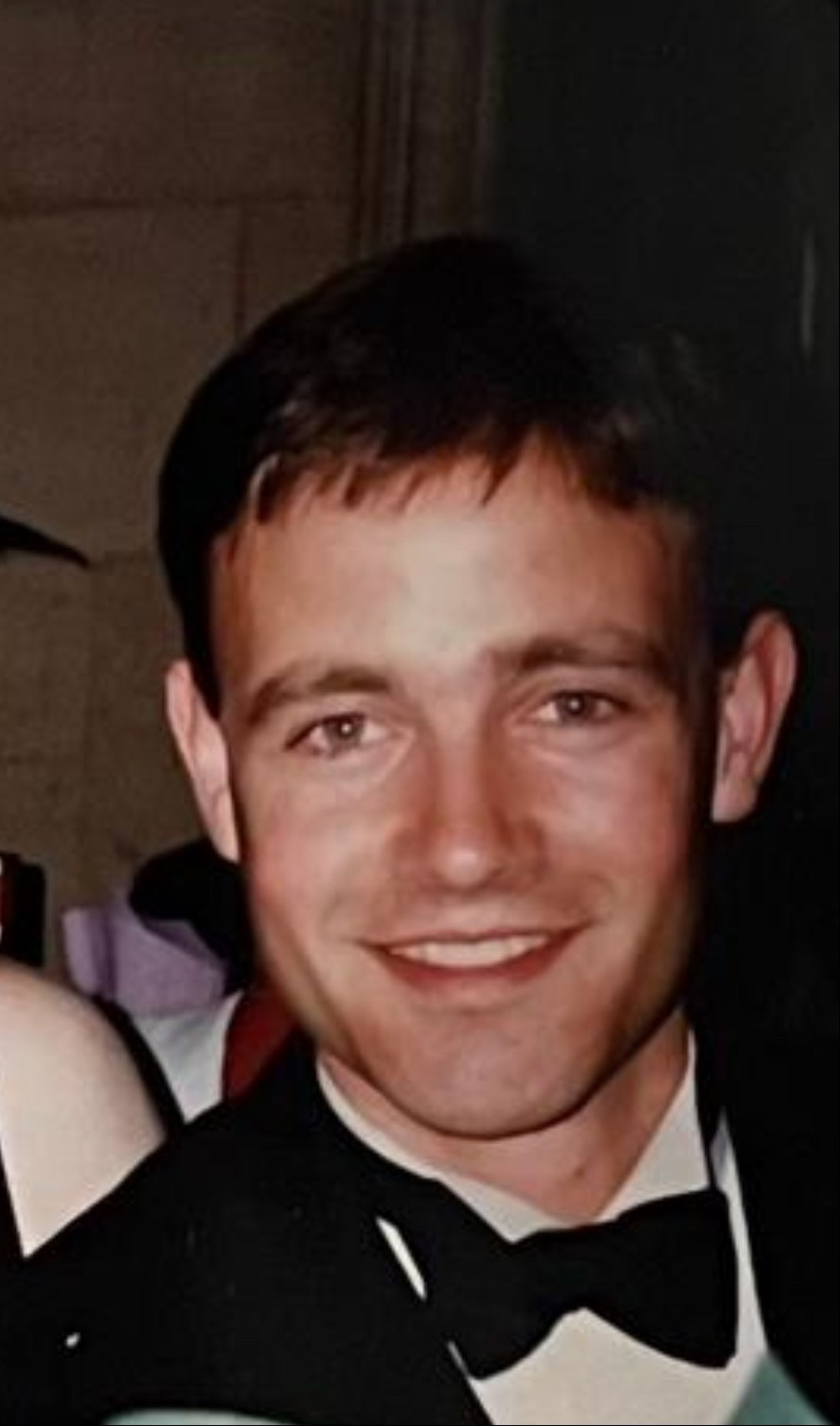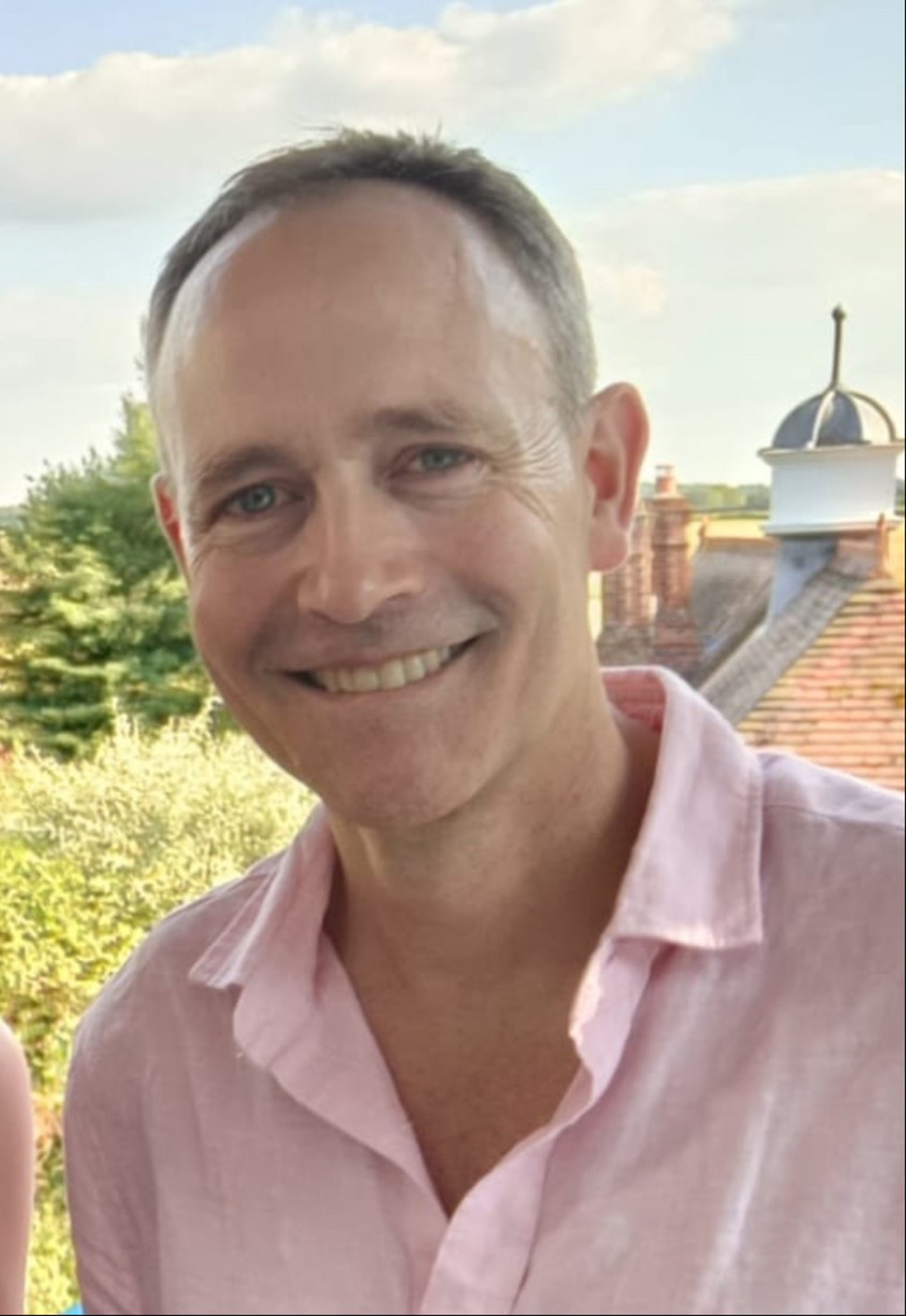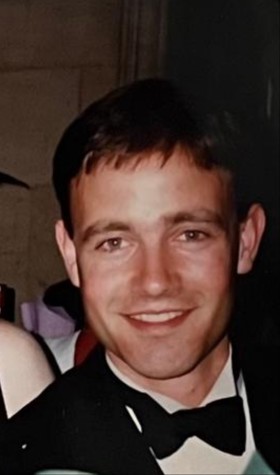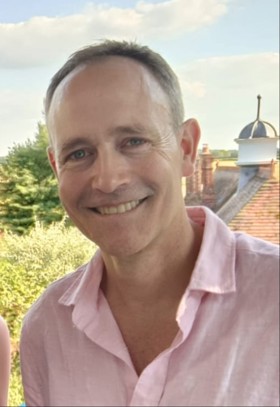Born in Wolmaransstad, South Africa in 1969, Pieter Pretorius qualified in medicine at the University of the Free State and practised medicine in Bloemfontein before going to Oxford to read for an MSc in radiology. He went on to take up a post as specialist registrar in radiology in Oxford. Pretorius is now a consultant radiologist at Oxford University Hospitals NHS Foundation Trust. His clinical role involves diagnostic neuroradiology and his research interests lie in the translation of neuroimaging advances to clinical care. This narrative is excerpted from an interview with the Rhodes Trust on 17 August 2024.
Pieter Pretorius
South Africa-at-Large & Green 1995




‘Education was a passport’
I was born at the height of apartheid in South Africa, and I lived in the white part of a small farming town. As a small child, as far as I was concerned, that was the only world that existed. I went to an Afrikaans school, where I saw only white children. My school used to celebrate the fact that Eugène Terre'Blanche, the leader of the Afrikaner Resistance Movement, had been a pupil there. He was what we would now call, clearly, a neo-Nazi. That gives you an idea of what society was like at that time. It was a culture that was very insular, and everything in my little cocoon seemed very safe. I was unaware of what was going in South Africa beyond that.
My parents didn’t go to university, and perhaps because of that, education was seen in my family as something very important. My father, in particular, believed that education was a passport, something nobody could take away from you. I think it’s a valuable way of thinking. Throughout the world, we’ve seen so many people in situations where their education is the thing that becomes the passport for a new life after some upheaval.
As I went through high school and into university, I began to develop an awareness of what an anomaly South Africa was, and that, plus my scepticism about religion – Afrikaner society was very religious – meant I became increasingly isolated from my peers. I became more and more disillusioned with it all. My father thought the country was at risk of violent revolution. He was wrong about those dangers, and we had a relatively peaceful transition. It’s one of the social miracles of our time, and I saw it play out.
On applying for the Rhodes Scholarship
I didn’t work that hard at school, and I have to say that these days, I’m not sure my grades would have been good enough to get me into a good university. I found medical school quite challenging, but I really enjoyed it. I had no one in my family to talk to about university, so when I got there, I just used a brute force approach, studying every hour of the day, working incredibly hard. When the first exams came around, I had gone from a point where I was middle of the class and a bit above at school to where I was suddenly right at the top at university. That sense of achievement took me by surprise and also became self-reinforcing: I wanted to have that feeling again. I got rewards I wasn’t used to, and working hard became a pleasure.
As a medical student, I worked across two hospitals in Bloemfontein. Even though South African society was changing, one of the hospitals was still predominantly for white people and the other predominantly for black people. I wasn’t surprised to see the difference in facilities between the two, because it was a reflection of the rest of society. There were also cultural differences in the way that people went about their day-to-day business in each hospital. For example, at the time of handover between nursing shifts, the black nurses would sing songs. It was like a little ceremony: special, and amazing to see.
At that point, I was literally unaware of the existence of the Rhodes Scholarship. But towards the end of university, one of the professors I really admired mentioned to me that the Scholarship existed and that I might want to consider applying for it. I’m pretty sure at that time I thought Oxford University was in London. But I kept the brochure he gave me, and when the time came that I could apply, I phoned and asked for the forms. The interviews then were a multi-step process. It was fascinating process, and I met some interesting young people from all over South Africa.
The applicant pool was still predominantly white at that point, because the education system was clearly giving an advantage to white people. I remember the politician Mamphela Ramphele, who was part of my Scholarship interview panel, sensing my excitement about the changes that were going on in South Africa. This was 1994, the year of the first democratic elections. She said, ‘What have you done to make this happen?’ and I remember thinking and then answering honestly that I had done nothing, literally nothing to make it happen. I was so ashamed, because there were people who had actually died to make this possible. I made her a promise – ‘I will make a cross on a piece of paper soon’ – that I would vote to make a change.
‘I’d just keep reading’
At Oxford, I applied to take a research degree in pathology, doing research on the genetic aspect of breast cancer. But when I got into the lab, I quickly realised that I didn’t like it. Molecular biology at that stage was very time-consuming, and the work was less interesting than reading papers about it. It also felt a bit divorced from the clinical setting I’d been used to. So, I switched projects to work on radiology. That gave me an opportunity to learn MRI and to realise that I liked that specialty.
I was at Green College – now Green Templeton – which is a postgraduate college. I picked it out just from reading bits of the brochure. I wasn’t very involved with Rhodes House, and at that time, there wasn’t much a community centred there. I also did some locum work to make extra money, and that meant that I could get my UK General Medical Council registration while I was still a research student. I just got on with things at college and at work, and I carried on my habit of working very hard. I’m quite an introvert anyway, and I would spend hours and hours in the Radcliffe Science Library. A lot of that was taken up with reading about things in medical science that weren’t part of my research, to be honest: my eye would fall on something and I’d just keep going, because it was so fascinating.
‘I like working out what’s going on’
My plan wasn’t initially to stay in Oxford. I’d applied for jobs in South Africa, and then to posts in Oxford just on the off chance. I was very happy when I got the registrar post, and transitioning to work in medicine in the UK was fairly straightforward at that time. I could have stayed on as a Rhodes Scholar for another year and done a DPhil, but because I got the job in Oxford, I wrote up my research as an MSc and got going on clinical work. I realised that diagnostic thinking is the thing that excites me, and that if I worked hard it, I could become good at it. A big part of my work is looking at scans of people with brain tumours and making the diagnosis that informs surgeons about the type of surgery that needs to be done. I also look at scans post-surgery, and also post-radiotherapy and post-chemotherapy, trying to work out what the response has been and what complications have occurred.
I like solving mysteries. I like thinking about probabilities and I like working out what’s going on. You take a mystery and try to unravel it, and that’s what diagnostic thinking is about. Some of the work is complicated, and the judgements are difficult, which is what makes it so satisfying. I don’t have that much contact with patients. Medicine has evolved to the point where we need people to look at computer screens so that they can help the people who are actually in contact with patients. But I do enjoy working in a big team of very talented people. There is pressure on everybody in the team not to be the weak link, because if you aren’t good at the bit of the job you do, other people can’t use their talents properly.
‘It’s something every generation needs to fight for’
It’s hard for me to imagine what my life would have been without the Rhodes Scholarship. I suspect I would have found myself in South Africa, probably working in private practice. I do a bit of private work here, but my focus is on the National Health Service (NHS). The NHS is an incredible thing to be part of. We’re not blind to its problems, but to work in a system where any sick person can walk through the doors of a hospital and avail themselves of care that is free at the point of use is the most remarkable social invention. It’s something every generation needs to fight for. For me and my colleagues, keeping that project on the rails is a big part of our lives.
